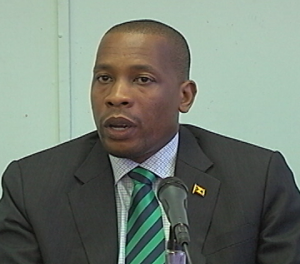ECCB governor wants debt standstill for sub-regional countries
Get our headlines on WHATSAPP: 1) Save +1 (869) 665-9125 to your contact list. 2) Send a WhatsApp message to that number so we can add you 3) Send your news, photos/videos to times.caribbean@gmail.com
 Mr. Timothy N. J. Antoine, the third Governor of the Eastern Caribbean Central Bank (ECCB)
Mr. Timothy N. J. Antoine, the third Governor of the Eastern Caribbean Central Bank (ECCB)

Governor of the Eastern Caribbean Central Bank Timothy Antoine. (Photo: St Lucia Voice)
The governor of the St Kitts-Nevis-based Eastern Caribbean Central Bank (ECCB), Timothy Antoine, says countries in the sub-region would appreciate “a debt standstill for about two years’ regarding their long-term debts so as to allow their economies to recover from the impact of the coronavirus (COVID-19) pandemic.
“What we would like for longer-term debt is a debt standstill for about two years to allow our economies to recover before resuming debt servicing,” Antoine said as he participated in the Central Bank of Barbados’ recent Caribbean Economic Forum on the topic “COVID-19 and Economic Policy Protecting Jobs, “Businesses and the Economy”.
“We have fought for this because we believe that all small states should have what we call disaster-linked clauses, such as if you have a shock of a certain magnitude, there is a standstill that is agreed upfront . . . between the issuer and investor,” Antoine said.
He said that the Mia Mottley Government in Barbados had secured such a clause in its recent debt-restructuring exercise and that this was a feature that the Organisation of Eastern Caribbean States (OECS) was seeking to have included when negotiating with multilateral institutions and other major lenders.

Antoine said the COVID-19 pandemic had highlighted the critical need for this waiver to be included in long-term debt financing.
“If a situation arises where there is a need, it triggers the standstill clause and you know for a period of time — one year or two years [you have a respite] then you resume [debt payments]. That is the work we have been doing with the International Capital Markets Association, the International Monetary Fund (IMF) and World Bank for the past several years.

“We have got them to agree to a term sheet. What we need now is the wide adoption of that term sheet. I pioneered that idea in Grenada in 2014/2015 with those debt clauses. I know Barbados did it recently in its restructuring. But we need that for all small states so that when there is an event — a hurricane, a pandemic or some kind of economic shock of a certain magnitude — we can have the facility.
“What that does is to enable our countries to recover even faster because you can invest in your recovery and then resume your debt servicing after.”
Antoine said what currently exists is that the Barbados-based Caribbean Development Bank (CDB) has not given debt relief “but what it has done is that it has provided a loan for member countries that need it, to remain current with the CDB.
“So if you have debt servicing of US$20 million, the CDB will provide you with a loan of US$20 million so that you can stay current. Now, this adds to your debt but it provides cash flow relief.
“In the case of the IMF and the World Bank, they do not provide that sort of relief. So four of our countries have gone to the IMF, like Jamaica has done, and got rapid credit facilities to the tune of US$81 million to assist with financing,” Antoine told the virtual panel discussion.
Leave a comment
You must be logged in to post a comment.